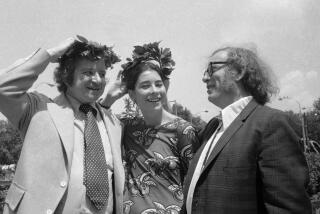Christopher Hitchens’ esophageal cancer, in his own words
- Share via
Writer Christopher Hitchens, 62, died Thursday of pneumonia, a complication of the esophageal cancer he battled for more than a year.
Hitchens was best known for his essays about politics and faith. An atheist, he famously debated religion with practicing Christians, including former British Prime Minister Tony Blair and National Institutes of Health director Dr. Francis Collins. But in the last year of his life he also distinguished himself by writing about his cancer, penning a National Magazine Award-winning series of columns for the magazine Vanity Fair.
Hitchens documented his stay in “Tumorville,” as he called it. He reflected on his emotions upon learning his diagnosis and starting chemotherapy. About losing his hair, he wrote:
I was fairly reconciled to the loss of my hair, which began to come out in the shower in the first two weeks of treatment, and which I saved in a plastic bag so that it could help fill a floating dam in the Gulf of Mexico. But I wasn’t quite prepared for the way that my razorblade would suddenly go slipping pointlessly down my face, meeting no stubble. Or for the way that my newly smooth upper lip would begin to look as if it had undergone electrolysis, causing me to look a bit too much like somebody’s maiden auntie. (The chest hair that was once the toast of two continents hasn’t yet wilted, but so much of it was shaved off for various hospital incisions that it’s a rather patchy affair.) I feel upsettingly de-natured.
About losing his voice, he noted that
“To a great degree, in public and private, I “was” my voice. All the rituals and etiquette of conversation, from clearing the throat in preparation for the telling of an extremely long and taxing joke to (in younger days) trying to make my proposals more persuasive as I sank the tone by a strategic octave of shame, were innate and essential to me. I have never been able to sing, but I could once recite poetry and quote prose and was sometimes even asked to do so. And timing is everything: the exquisite moment when one can break in and cap a story, or turn a line for a laugh, or ridicule an opponent. I lived for moments like that. Now, if I want to enter a conversation, I have to attract attention in some other way, and live with the awful fact that people are then listening “sympathetically.” At least they don’t have to pay attention for long: I can’t keep it up and anyway can’t stand to.
NIH’s Collins, a friend, advised Hitchens on new treatments that might have helped him -- reportedly mapping Hitchens’ DNA to help look for targeted therapies -- and wrote about their relationship last year.
To read more of Hitchens’ essays about his illness, visit Vanity Fair.
For more information about causes, symptoms and treatment of esophageal cancer, visit the Mayo Clinic or the National Institutes of Health’s PubMed.
Return to the Booster Shots blog.
More to Read
Sign up for Essential California
The most important California stories and recommendations in your inbox every morning.
You may occasionally receive promotional content from the Los Angeles Times.














